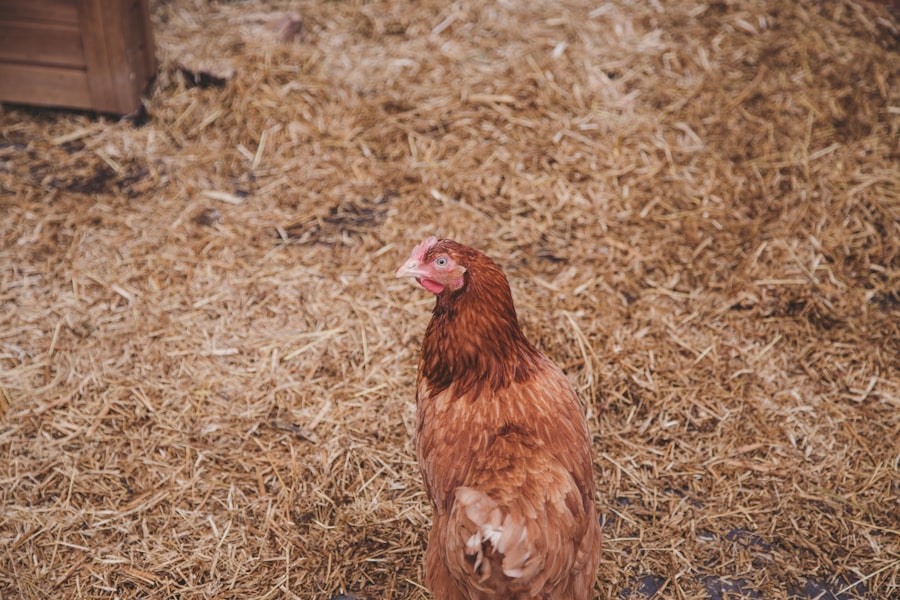Keeping chickens has become an increasingly popular hobby for many people, whether it be for the joy of watching these fascinating creatures or for the practicality of having fresh eggs daily. It is a rewarding and fulfilling experience that allows individuals to connect with nature and enjoy the benefits of sustainable living. In recent years, there has been a surge in backyard chicken keeping, with more and more people realizing the joys and benefits of having their own flock.
Key Takeaways
- Keeping chickens can be a rewarding and enjoyable experience for many people.
- Before keeping chickens, it is important to consider factors such as space, zoning laws, and predator protection.
- Benefits of keeping chickens include fresh eggs, natural pest control, and fertilizer for gardens.
- There are various types of chicken coops to choose from, including stationary and mobile options.
- When choosing a location for your chicken coop, consider factors such as sunlight, drainage, and accessibility.
Factors to Consider Before Keeping Chickens
Before diving into the world of chicken keeping, there are several factors that need to be considered. First and foremost, it is important to check local laws and regulations regarding chicken keeping. Some areas have restrictions on the number of chickens allowed or may require permits. It is crucial to ensure that you are in compliance with these regulations to avoid any legal issues.
Another important factor to consider is the amount of space needed for chickens and the number of chickens to keep. Chickens require adequate space to roam and forage, so it is essential to provide them with a suitable environment. The general rule of thumb is to allow at least 4 square feet per chicken in the coop and 10 square feet per chicken in the outdoor run. Additionally, it is important to consider the time commitment required for chicken care. Chickens need daily feeding, watering, and cleaning, so it is important to be prepared for the responsibility that comes with keeping them.
Benefits of Keeping Chickens
One of the main benefits of keeping chickens is having fresh eggs daily. There is nothing quite like collecting eggs from your own backyard and enjoying them for breakfast. Not only are homegrown eggs delicious, but they are also healthier than store-bought eggs. Studies have shown that eggs from backyard chickens have higher levels of omega-3 fatty acids and lower levels of cholesterol compared to commercial eggs.
Another benefit of keeping chickens is the use of chicken manure as fertilizer. Chicken manure is rich in nutrients and can be used to fertilize gardens and plants. It is a natural and sustainable way to improve soil fertility and promote healthy plant growth. Additionally, chickens help control pests in the garden by eating insects and other small creatures.
Furthermore, keeping chickens can be a source of joy and entertainment. Chickens have unique personalities and behaviors that are fascinating to observe. They are social animals that form bonds with their owners and can be quite affectionate. Watching them scratch the ground, take dust baths, or interact with each other can be incredibly entertaining and therapeutic.
Types of Chicken Coops
When it comes to chicken coops, there are several options to choose from. The two main types of chicken coops are stationary coops and mobile coops. Stationary coops are fixed structures that provide a permanent home for the chickens. They are typically made of wood and have a fenced-in outdoor run attached to the coop. Stationary coops offer more protection and security for the chickens but require a larger space.
On the other hand, mobile coops, also known as chicken tractors, are portable structures that can be moved around the yard. They are usually made of lightweight materials such as PVC pipes or metal frames covered with wire mesh. Mobile coops allow chickens to graze on fresh grass while still providing them with shelter and protection from predators. They are ideal for smaller spaces or for those who want to rotate their chickens around the yard.
Both types of coops have their pros and cons, so it is important to consider your specific needs and preferences when choosing the right coop for your flock.
Choosing the Right Location for Your Chicken Coop
Choosing the right location for your chicken coop is crucial for the safety and well-being of your chickens. The coop should be placed in an area that is safe from predators such as raccoons, foxes, and dogs. It should also be secure from other potential threats such as rodents or snakes. It is important to have a sturdy fence around the coop to keep predators out and chickens in.
In addition to safety, the coop should also provide shade and protection from the elements. Chickens are sensitive to extreme temperatures, so it is important to choose a location that offers shade during hot summer months and protection from wind and rain. Trees or shrubs can provide natural shade, or you can use tarps or awnings to create a shaded area.
Materials Needed for Building a Chicken Coop

When building a chicken coop, there are several materials that you will need. The main material for the coop itself is wood, which can be used for the frame, walls, and flooring. It is important to choose a durable and weather-resistant wood such as cedar or redwood. Other materials needed include wire mesh for the windows and doors, roofing materials such as shingles or metal sheets, and hardware such as hinges and latches.
In terms of tools, you will need basic carpentry tools such as a saw, hammer, drill, and screwdriver. It is also helpful to have a level and measuring tape to ensure that everything is straight and properly aligned. If you are not comfortable with building your own coop from scratch, there are pre-made coop kits available that come with all the necessary materials and instructions.
Designing Your Chicken Coop for Optimal Comfort and Safety
When designing your chicken coop, it is important to prioritize the comfort and safety of your chickens. One of the key factors to consider is proper ventilation. Chickens produce moisture through their droppings and respiration, so it is important to have adequate airflow in the coop to prevent the buildup of ammonia fumes. This can be achieved by installing windows or vents that can be opened or closed depending on the weather.
Another important aspect of coop design is lighting. Chickens need natural light to regulate their internal clocks and lay eggs. It is important to have windows or skylights in the coop to allow natural light to enter. Additionally, you can install artificial lighting to supplement natural light during the winter months when daylight hours are shorter.
Furthermore, the coop should have nesting boxes for the chickens to lay their eggs. These boxes should be dark and secluded to provide a sense of privacy and security for the hens. The number of nesting boxes needed depends on the number of chickens you have, but a general rule of thumb is one nesting box for every 3-4 hens.
Maintaining Your Chicken Coop
Regular cleaning and maintenance of the chicken coop are essential for the health and well-being of your chickens. The coop should be cleaned at least once a week to remove droppings, feathers, and any other debris. This can be done by using a rake or shovel to scoop out the bedding material and then replacing it with fresh bedding.
In addition to cleaning, it is important to regularly check for pests such as mites or lice. These parasites can cause discomfort and health issues for your chickens, so it is important to take preventive measures such as dusting the coop with diatomaceous earth or using natural pest control products.
Furthermore, it is important to collect eggs daily to prevent them from being damaged or eaten by predators. Leaving eggs in the nest can attract pests or encourage broodiness in hens. It is also a good idea to keep a record of egg production to monitor the health and productivity of your flock.
Tips for Raising Healthy Chickens
Raising healthy chickens requires providing them with a balanced diet and regular health checks. Chickens need a diet that consists of high-quality chicken feed, supplemented with fresh fruits, vegetables, and grains. It is important to provide them with a variety of foods to ensure that they are getting all the necessary nutrients.
Additionally, chickens should have access to clean water at all times. Waterers should be cleaned and refilled regularly to prevent the growth of bacteria or algae. It is also important to provide grit or oyster shells to help chickens digest their food and strengthen their eggshells.
Regular health checks are also important to ensure the well-being of your flock. This includes checking for signs of illness or injury, monitoring egg production, and observing their behavior. If you notice any abnormalities or concerns, it is important to consult a veterinarian who specializes in poultry health.
The Best Place to Keep Chickens and Why a Chicken Coop is Essential
In conclusion, keeping chickens can be a fun and rewarding hobby or a practical way to have fresh eggs daily. It allows individuals to connect with nature, enjoy the benefits of sustainable living, and experience the joy of watching these fascinating creatures. However, it is important to consider several factors before diving into chicken keeping, such as local laws and regulations, space requirements, and time commitment.
A chicken coop is an essential component of keeping chickens as it provides them with shelter, protection from predators, and a comfortable environment. There are different types of coops available, each with its own pros and cons. When designing a coop, it is important to prioritize the comfort and safety of the chickens by providing proper ventilation, lighting, and nesting boxes.
Maintaining a chicken coop requires regular cleaning and maintenance, as well as pest control and egg collection. Raising healthy chickens involves providing them with a balanced diet, clean water, and regular health checks. By considering these factors and following these tips, individuals can enjoy the benefits of keeping chickens while ensuring the well-being of their flock.
If you’re looking for the best place to keep chickens, you’ll definitely want to check out this informative article on Poultry Wizard. They have a variety of helpful resources, including chicken coop run plans, a farmhouse chicken coop guide, and even tips on chicken coop portage. Whether you’re a beginner or an experienced chicken keeper, Poultry Wizard has everything you need to create a comfortable and safe environment for your feathered friends. Don’t miss out on their valuable insights – click here to explore their website: https://poultrywizard.com/keeping-chickens/chicken-coop-run-plans/.
FAQs
What is the best place to keep chickens?
The best place to keep chickens is in a secure and spacious coop with an attached outdoor run.
What should I consider when choosing a location for my chicken coop?
When choosing a location for your chicken coop, consider factors such as access to sunlight, shade, and fresh water, protection from predators, and proximity to your home for easy care and maintenance.
How much space do chickens need?
Chickens need at least 4 square feet of indoor space and 10 square feet of outdoor space per bird to live comfortably and maintain good health.
What materials should I use to build a chicken coop?
Chicken coops can be built using a variety of materials, including wood, metal, and plastic. The most important factor is that the materials are sturdy, weather-resistant, and provide adequate ventilation.
What should I include in my chicken coop?
A chicken coop should include roosting bars, nesting boxes, a feeder, and a waterer. It should also have adequate ventilation and be easy to clean and maintain.
How do I protect my chickens from predators?
To protect your chickens from predators, you can use fencing, netting, and other barriers to keep them out of the coop and run. You can also use motion-activated lights and alarms to deter predators from approaching the coop.
Meet Walter, the feathered-friend fanatic of Florida! Nestled in the sunshine state, Walter struts through life with his feathered companions, clucking his way to happiness. With a coop that’s fancier than a five-star hotel, he’s the Don Juan of the chicken world. When he’s not teaching his hens to do the cha-cha, you’ll find him in a heated debate with his prized rooster, Sir Clucks-a-Lot. Walter’s poultry passion is no yolk; he’s the sunny-side-up guy you never knew you needed in your flock of friends!







